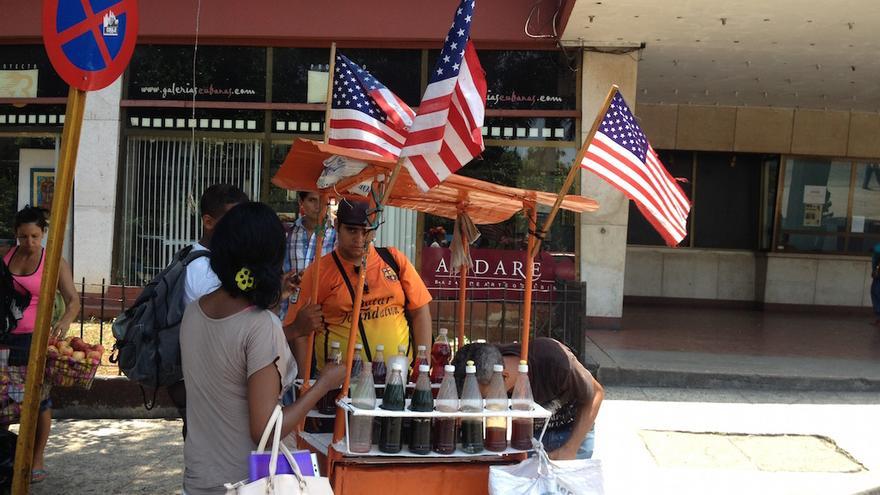
![]() 14ymedio, Havana, February 15, 2021– Cuban citizens residing inside and outside the Island have published a letter asking the U.S. Government not to normalize relations with Cuba as long as the Cuban Government hasn’t normalized relations with its own citizens. The text is also addressed to the Cuban Government and the U.S. Congress.
14ymedio, Havana, February 15, 2021– Cuban citizens residing inside and outside the Island have published a letter asking the U.S. Government not to normalize relations with Cuba as long as the Cuban Government hasn’t normalized relations with its own citizens. The text is also addressed to the Cuban Government and the U.S. Congress.
The signers say that they were disillusioned with the thaw between the U.S. and Cuba that began during the presidency of Barack Obama in 2014. They learned something from the frustration of that moment, and their petition is based on these lessons.
“During normalization, there were no advances in human rights on the Island. National and international organizations documented high levels of repression against civil society and opponents of the Regime. Many activists, journalists, entrepreneurs, and artists who supported normalization have since gone into exile,” they emphasize.
The petitioners consider that totalitarianism is inherent to the Regime, and they point out that since Joe Biden was elected President of the U.S., and especially since he took office, the arrests and harassment of several people from civil society have increased.
In addition to alluding to the repressive nature of the Cuban authorities, they refer to problems related to the economic system, which weren’t resolved in the previous reestablishment of relations and, on the contrary, deepened the inequalities. “During the previous thaw, it’s true that a certain urban middle class grew that maintained an attitude of non-confrontation or collaboration with the Regime, but the impoverished majority of the country didn’t benefit.”
In the text, the activists declare themselves committed to the democratic advancement of Cuba and support a new negotiation between the governments of Havana and Washington, but with six conditions, which are, in their opinion, “minimal and indispensable.”
First, they call for diverse groups in civil society to actively participate in the normalization process. In addition, they request that the negotiations be transparent and that what is addressed in the meetings be made known to citizens of both countries and disseminated by the press, without a distinction between the official and the independent press, in the case of Cuba.
“The process should be accompanied by mediators of credibility and experience such as the Vatican, Norway, and the European Parliament, and it should multilaterally involve governments and civil society in Europe and Latin America,” they claim.
The third condition is that there be official recognition of the “civil, economic and political” rights for Cubans, and that the Cuban Government ratify the international agreements on human rights.
They also demand that the human rights agreements have specific goals that can be evaluated and supervised by other governments, and that the process of normalization be discontinued in the case of violations.
The immediate release of political prisoners and the legalization of civil and political organizations should be, they assert, the first requirement, without which no negotiating process should be initiated.
With regard more specifically to the U.S. Government, the document also calls for the restrictions on travel and the sending of remittances “by civil means” as well as through consular procedures to be repealed.
Meanwhile, the Cuban side must eliminate “the prohibitions from leaving and entering the country for doctors, athletes, professionals, dissidents, activists, and all people who are unjustly deprived of these rights.”
“Let Cuba insert itself in the world as a truly sovereign country, respectful of human rights and democratic, something that today is far from being a reality. All negotiations must be focused on this objective,” concludes the text, signed by more than 300 Cubans from inside and outside the Island, among whom are Luis Manuel Otero Alcántara, Anamely Ramos, Maykel Castillo Osorbo, Camila Lobón, Héctor Luis Valdés Cocho, Henry Constantín, Carlos A. Aguilera, Armando Chaguaceda, Orlando Luis Pardo Lazo , Rosa María Payá, Eliécer Ávila, and Rafael Rojas.
The letter comes a week after another letter addressed to U.S. President Joe Biden requesting the restoration of dialogue and normalization of relations between the two countries. In that case, the petitioners were around more than 300 scientists, intellectuals, artists and entrepreneurs, who said that the Cubans expect the President to “take the first step and unconditionally lift the sanctions imposed on Cuba.”
Translated by Regina Anavy
____________
COLLABORATE WITH OUR WORK: The 14ymedio team is committed to practicing serious journalism that reflects Cuba’s reality in all its depth. Thank you for joining us on this long journey. We invite you to continue supporting us by becoming a member of 14ymedio now. Together we can continue transforming journalism in Cuba.
